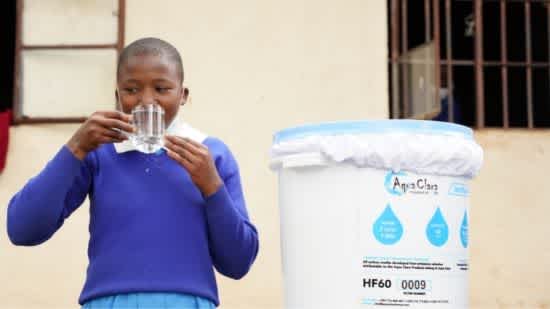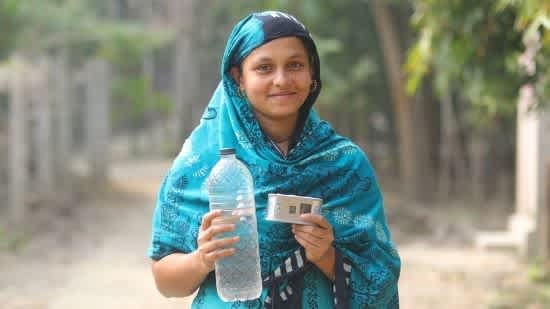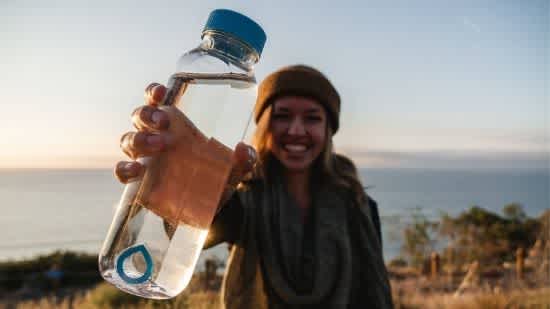SDG 6: Clean Water and Sanitation

Water is one of the most basic needs and a fundamental human right – yet we still live in a world where one in three people globally do not have access to safe drinking water (UNICEF).
Today, 2.2 billion people can’t drink water safely, including 884 million currently without basic drinking water services. The UN Sustainable Development Goal 6 (SDG 6) focuses on ensuring water and sanitation availability and sustainable management for all.
While many concentrated efforts address the water access inequality in the Global South, the 2019 United Nations World Water Development report has shown that also Europe and North America have work to do. Similarly, B Lab’s latest SDG Insights Report with key findings from the SDG Action Manager shows that both regions have the lowest performance regarding Clean Water and Sanitation (SDG 6).
B Corps around the world are doing an excellent job in advancing towards this goal. Some have developed innovative solutions to make clean water accessible to everyone. Others implement various good practices: from protecting water-related ecosystems to reducing their water consumption in agriculture, industrial use, energy generation and many other sectors. Here we mention companies that are not only directly helping local communities but also inspiring and empowering the rest of the world to take action.

Since its establishment, Aqua Clara Kenya has been distributing simple, affordable and effective technologies that have enabled more than 300,000 people across East Africa to access safe drinking water. Their filters and rainwater harvesting systems are essential to families and schools that depend exclusively on contaminated water sources in rural areas. Aqua Clara also has long-term sustainability in mind: training programs ensure that the population acquires the know-how at the local level. The H2OPE Accelerator program provides a complete educational experience followed by ongoing support and guidance.
Watalux in Geneva developed WATA™ as a local and affordable way to disinfect and treat water to tackle waterborne diseases. By using only salt and water, this technology produces active chlorine locally and at a low cost, eliminating 99.9% of the pathogenic microorganisms to ensure safe consumption.

HELIOZ provides safe drinking water to thousands of families across India, Africa, and Southeast Asia through corporate partnerships. HELIOZ uses one of the simplest methods for providing adequate drinking water: heat. The WADI device is a solar-powered UV measurement device that visualizes the process of solar water disinfection (SODIS) in PET or glass bottles. A smiley face on the WADI confirms when the water is safe to drink.
One example of these partnerships includes EWS – Elektrizitätswerke Schöna’s Christmas campaign in partnership with HELIOZ. For every new customer, EWS invested 35 euros into the HELIOZ drinking water project in Uganda. As a result, 100.000,00 euros went into the project and 3,000 families in Uganda will have access to safe drinking water for several years. The population has experienced 80% fewer incidences of waterborne diseases, 30% more lessons in schools and 60% less firewood, which otherwise would have been collected for boiling water.
What would happen if thousands of companies were connected to solve social and environmental challenges? Proyecto Conecta is an innovative proposal that seeks to use the strength of the market to ensure that water, sanitation, and hygiene solutions are sustainable over time and reach more and more people.
The Swiss Agency for Development and Cooperation (SDC) has provided water and essential sanitation solutions in different areas of Colombia. The first pilot project, launched with Sistema B, will be implemented in two rural communities in Colombia, Caloto and Cajibío, Cauca, and two in Perù. Both organizations will work hand in hand for four years to improve people’s health and quality of life. This project aims at becoming a sustainable management model, which can be replicated in other communities, regions, countries, and entities as a solution to the same problems. They believe that market-driven innovations can improve access to clean water and sanitation in the region.
The Argentinean Empresa B Agua Segura works together with large corporations that face water challenges for their businesses, their communities and the environment in which they operate. They develop, manage, and implement water access, sanitation and hygiene (WASH) and environmental water projects that positively impact the business, resource efficiency, and communities. They have managed more than 3,600 projects, improved the lives of more than 186,000 people and provided 162,000,000 liters of water.
In the Philippines, Hope seeks to address multiple issues by donating 100% of its profits towards social impact projects. Through sales of its bottled water, the organization democratizes nation-building by providing the public with easy and sustainable ways to invest in social goods. With most of the funds go towards building public schools, at the end of 2020, Hope led a relief drive in response to the typhoon Ulysses, distributing 63,990 bottles of clean water to communities affected by the disaster.

Canadian B Corp Fill it Forward hopes to inspire the world to reuse. Beyond reusable products and interactive technologies, the organization has created global giving initiatives to tackle single-use waste and contribute to charitable projects worldwide. Every time you refill and scan your Reuse Tracker, they make a contribution to their partners who are bringing clean water and nutritious food to people in need, including WaterAid, charity: water, DIGDEEP, Water First, among others.
Due to climate change and increased industrialization, water availability is becoming less predictable in many parts of the world. Beyond expanding the accessibility of drinking water, it is also crucial to scale up efforts to protect water at the source.
In 2019, eight projects in watersheds where Danone operates (Aguascalientes, Badoit, Evian, Klaten, La Salvetat, Pasuruan, Villavicencio, Volvic) benefited from integrated watershed management and a water stewardship action plan.
These plans were based on the sustainable preservation and resource management method (or SPRING method), co-developed in 2013 with The Ramsar Convention of Wetlands (4) and IUCN, and are early examples of specialized methods developed for more sustainable management of groundwater resources. 100% of their water sourcing and bottling sites have run SPRING audits and implemented a continuous improvement plan. The Ramsar Convention has designated two areas where Danone has implemented stewardship programs as sites of international importance – the Evian impluvium (5) in France and the Villavicencio reserve in Argentina.
Companies of all sizes, sectors in all parts of the world can improve access to clean water and sanitation through their impact business model, supply chain operations, partnerships, and more. If you’re looking to understand better how you can contribute and manage your future impact, check out the SDG Action Manager, a free tool developed by B Lab and the UN Global Compact.
This tool will help you discover how your company performs against the SDGs most relevant to your business practices, measure current performance, identify risk areas and set goals to improve your performance. Get started today at https://bcorporation.net/welcome-sdg-action-manager